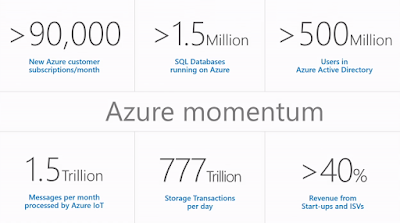Microsoft has acquired 158 acres of land in San Antonio with plans to build one of the largest data centers in the country, according to a report from the San Antonio Business Journal.
Microsoft reportedly looks to break ground in the coming months on an eight-building data center campus of over 1 million square feet. The company did not comment on the report.
feet.
http://www.bizjournals.com/sanantonio/news/2015/12/10/exclusive-microsoft-buys-nearly-160-acres-in-far.html
Microsoft Azure Takes Big Steps Forward
At its AzureCon 2015 event, Microsoft rolled out a number of big improvements to its Azure cloud platform centered around containers, security, infrastructure and the Internet of Things (IoT). The company also announced the availability of Microsoft Azure services in India from three regional data centers: Central India in Pune, South India in Chennai, and West India in Mumbai
"We live in a connected world, and the intelligent cloud is powering it all,” said Scott Guthrie, executive vice president of Microsoft’s Cloud + Enterprise Division. “As data and devices continue to proliferate, there is vast opportunity for businesses to tap into their data to make their applications more intelligent
Highlights include:
General availability of Azure File Storage, featuring support of SMB 3.0 and the ability to mount file shares from anywhere (Azure or on-premises).
https://azure.microsoft.com/en-us/blog/
"We live in a connected world, and the intelligent cloud is powering it all,” said Scott Guthrie, executive vice president of Microsoft’s Cloud + Enterprise Division. “As data and devices continue to proliferate, there is vast opportunity for businesses to tap into their data to make their applications more intelligent
Highlights include:
General availability of Azure File Storage, featuring support of SMB 3.0 and the ability to mount file shares from anywhere (Azure or on-premises).
- More that 40% of revenue on Azure comes from start-ups
- 80% of Fortune 500 are using the Microsoft cloud.
- New Azure Container Service -- building on work with Docker and Mesosphere to create and manage scalable clusters of host machines onto which containerized applications can be deployed, orchestrated, and managed. Azure Container Service makes it easier to create and manage clusters of hosts pre-configured with Docker, Apache Mesos, Marathon and Docker Swarm. This work couples Azure's hyper-scale and enterprise-grade cloud with proven open source technologies to deliver the foundation for the container deployment, orchestration, and management service any team building container apps will need.
- New N-series, a new family of Azure Virtual Machines (VMs) powered by NVIDIA GPUs. Microsoft is the first hyper-scale provider to announce VMs featuring NVIDIA Grid 2.0 technology and the industry-leading Tesla Accelerated Computing Platform for professional graphics applications, deep learning, high-performance computing and more. A preview will be available in a few months.
- New Azure Mobile Engagement -- a new SaaS-delivered, data-driven user engagement platform that enables real-time fine-grain user segmentation, app user analytics, contextually-aware smart push notifications and in-app messaging across all connected devices.
- New Linux for Azure Data Lake -- aiming to make big data technology simpler and more accessible. Azure Data Lake makes HDInsight, which is Microsoft's Apache Hadoop-based service. Customers logging into the Azure Portal will now have a choice to select either Windows or Linux when deploying HDInsight.
- New Azure IoT Suite -- brings together preconfigured offerings to enable companies to leverage Azure Stream Analytics for IoT. The latest Stream Analytics updates include support for IoT Hub input the ability to output stream analytics to Azure DocumentDB.
- New Azure CDN using the Akamai network -- integrating Akamai’s CDN capabilities directly into the Microsoft Azure cloud platform.
- New Shared Access Signatures, delivering full parity with storage account keys and providing a more secure alternative to delegating access to storage users than storage account keys provide.
- New Azure Storage client library for iOS.
- The Azure Storage client library for Java will soon support client-side encryption complementing the existing capability in the Azure Storage client library for .Net.
- New Azure support for the Financial Services Industry, including a detailed set of Payment Card Industry (PCI) and Data Security Standard (DSS) guidance describing Azure and customer shared responsibilities.

https://azure.microsoft.com/en-us/blog/











